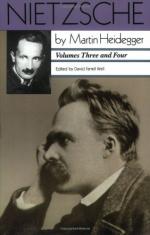|
This section contains 4,268 words (approx. 15 pages at 300 words per page) |

|
SOURCE: “Albert Camus: From Nihilism to Revolt,” in The Literature of Nihilism, Bucknell University Press, 1975, pp. 198-209.
In the following essay, Glicksberg examines Camus' attitude toward nihilist philosophy as evinced in his work, contending that his fiction is actually “protests against the fate of meaninglessness.”
Camus simply lived through and documented what Nietzsche saw looming up in the twentieth century: namely, the nihilism which would result while the technological world adapted to its horrifying discovery that God was very, very dead, and that there was no ultimate and absolute meaning to either human life or the universe: they simply were.1
There is nothing more incontestable than the fact that Meursault, in certain of his aspects, embodies that temptation toward an active nihilism and impersonality which constitutes, among others, one of the permanent characteristics of Camus's work.2
Camus had never expressed any nihilistic point of view as being his...
|
This section contains 4,268 words (approx. 15 pages at 300 words per page) |

|


